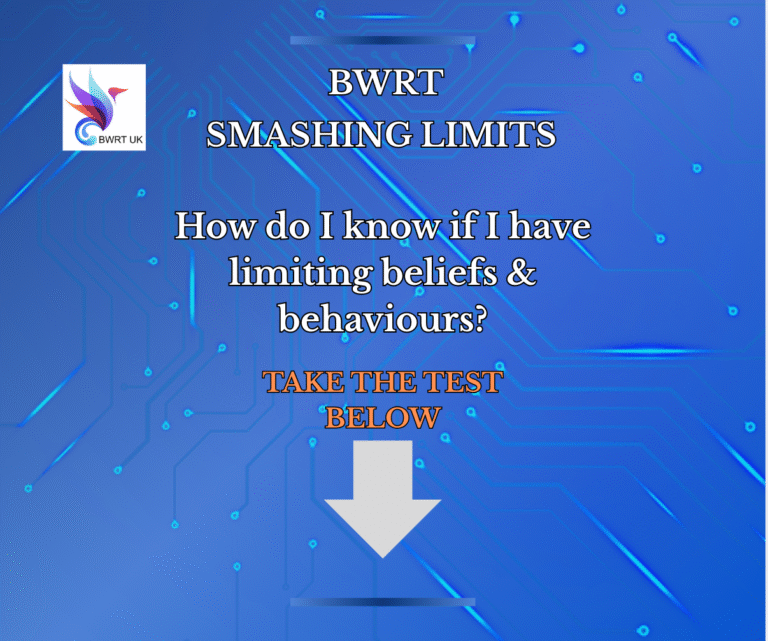Rapid Change Mindset Coaching
Powered by BWRT
As a BWRT Professional Mindset Coach I use BrainWorking Recursive Therapy to help clients overcome emotional and mental challenges by:-
1.Eliminating the limiting processes that underpin limiting beliefs and behaviours.
2.Using Neural Manifestation to clear conflicts that cause failure and self doubt allowing you to spot opportunities to achieve your goals and wishes.
3.Resolution of psychological blocks around all things financial.
4.Discovering your true personality to understand fully what you are all about so that you can amplify your resources to another level – Are you a Warrior, Settler or Nomad?

What Are Limiting Beliefs and Behaviours?
Definition: Limiting beliefs are deeply ingrained thoughts or convictions that hinder a person’s potential and growth. These beliefs often stem from past experiences, societal norms, or childhood influences. Limiting behaviours are the actions or inactions that result from these beliefs.
Examples: Common examples include thoughts like “I’m not good enough,” “I’ll never be successful,” or “I don’t deserve happiness.” These beliefs often manifest in avoidance, procrastination, or self-sabotage.
Where Do Limiting Beliefs Come From?
Early Childhood Experiences: From a young age, we are often told what we can and can’t do, what’s expected of us, and how we should behave. These teachings can shape beliefs about our capabilities.
Family and Cultural Influence: The values and beliefs handed down by family members, communities, and cultures can reinforce certain worldviews, even if they limit personal growth. For instance, a family may value financial security over personal passion, leading a child to believe they can only find success in traditional roles.
Societal Expectations: Societal norms, such as gender roles or expectations about race and class, can impose limitations on what individuals believe they can achieve.
Past Failures or Criticism: Experiences of failure or criticism, especially in formative years, can lead to the creation of beliefs that we’re not capable or worthy of success.
Media and External Pressures: Media portrayals of success, beauty, and intelligence often set unrealistic standards, leading many to believe they can’t measure up, even if those portrayals are unattainable or superficial.
So what’s going on and why do we get limiting behaviours and beliefs?
The subconscious mind has always been shrouded in mystery and never found to have any tangible physical presence in the brain. However, the latest thinking is that what we have previously been referring to as the subconscious is actually a region in the brain known as the Reptilian Complex, the oldest part of the brain dating back some 650 million years ago to the first sentient creatures on the earth.
The Reptilian Complex (also referred to as the RC or early part of the brain) comprises the Amygdala responsible for fight or flight response, Brain Stem for autonomic function and the Cerebellum where 80% of the total number of neurones in the brain reside and is connected to almost all other parts of the brain.
The Reptilian Complex (RC) is your survival mechanism and it will do anything and everything to keep you and your integrity safe.

How do I know if I have Limiting Beliefs & Behaviours?
Take the limiting belief test:-
1. I’m not good enough.
Believing you’re inherently inadequate or unworthy of success, love, or respect.
2. I don’t deserve success.
Thinking that success is for others, but not for you, often rooted in feelings of guilt or low self-worth.
3. I’m not smart enough.
The belief that intelligence is fixed and that you don’t have the ability to learn or succeed in certain areas.
4. I’m too old/too young to change.
The belief that age limits your potential for growth or success, whether you’re too young to start or too old to change.
5. I’ll never be successful.
A deep conviction that success is unattainable for you, often tied to past failures or societal expectations.
6. I don’t have enough time.
The belief that you’re too busy or that you can’t find the time to pursue your goals or passions.
7. Failure means I’m a failure.
The idea that making mistakes or failing is a reflection of your worth, not just a part of the learning process.
8. I’ll never be good with money.
A belief that you’re inherently bad with managing finances, often stemming from childhood or family experiences.
9. I must be perfect to succeed.
The belief that perfection is required in everything you do, leading to constant self-criticism and fear of making mistakes.
10. I’m not as good as others.
Constantly comparing yourself to others and feeling like you fall short in terms of skills, appearance, or achievements.
11. I don’t have control over my life.
Feeling powerless and believing that external circumstances or others dictate your outcomes.
12. If I succeed, I’ll lose my friends/family.
Fearing that success will alienate you from those close to you or that they will become jealous of your achievements.
13. I’m not deserving of love.
The belief that you’re unworthy of deep, fulfilling relationships and that love is reserved for others, not you.
14. Money is the root of all evil.
A belief that wealth is inherently bad or that pursuing financial success is selfish or immoral.
15. I don’t have the resources I need.
Thinking you lack the money, time, connections, or support to achieve your goals.
16. I’m just not lucky.
Believing that good things happen to others, but you’re just unlucky, which prevents you from seizing opportunities.
17. I’ll never be able to change.
Feeling stuck in your current circumstances, believing that change is impossible or too difficult to achieve.
18. People will judge me if I fail.
The belief that failing will result in negative judgement or rejection from others, leading to fear of taking risks.
19. I must always please others.
Believing that your value comes from making others happy and constantly seeking approval, often at the cost of your own happiness.
20. I’m not capable of handling challenges.
A belief that you lack the skills or strength to face challenges, leading to avoidance or a sense of helplessness.
21. I am not worthy of success or happiness.
The belief that you don’t deserve good things in life, whether it’s success, happiness, or fulfillment.
22. I have to do it all by myself.
Believing that asking for help is a sign of weakness, leading to overwork, stress, and isolation.
23. Life is supposed to be hard.
Believing that struggle is a necessary part of life, which can prevent you from experiencing ease, joy, and fulfillment.
24. I can’t trust anyone.
Believing that others are untrustworthy, often as a result of past betrayals, and limiting your ability to build healthy relationships.
25. I am too different to fit in.
Feeling like an outsider or that your uniqueness makes you unworthy of success, belonging, or love.
And now check for limiting behaviours as a result of limiting beliefs…
1. Procrastination
Avoiding important tasks due to fear of failure, perfectionism, or lack of confidence.
2. Self-Sabotage
Engaging in actions that undermine your own success, often unconsciously, because you feel unworthy or fear success.
3. People-Pleasing
Constantly trying to please others at the expense of your own needs and desires, often due to a belief that you are not good enough on your own.
4. Perfectionism
Setting unrealistically high standards and refusing to take action unless things are “perfect,” which leads to inaction.
5. Fear of Failure
Avoiding opportunities or challenges because of a deep fear of failing, leading to missed chances and lack of growth.
6. Imposter Syndrome
Doubting your abilities and feeling like a fraud, even after achieving success, often resulting in stress, anxiety, and avoidance of opportunities.
7. Avoidance of Risks
Steering clear of anything that could cause discomfort or uncertainty, even if it holds the potential for growth and success.
8. Negative Self-Talk
Engaging in constant, self-critical thoughts, leading to low self-esteem and discouragement.
9. Overthinking and Analysis Paralysis
Overanalyzing situations or decisions, leading to indecision and inaction.
10. Self-Doubt
Consistently questioning your abilities and worth, preventing you from taking action toward your goals.
11. Disbelief in Change
Believing that change is impossible or that you cannot improve, leading to stagnation and a lack of motivation.
12. Playing Small
Undervaluing your abilities and potential, and not striving for bigger goals because of a belief that you don’t deserve success.
13. Procrastination by Busyness
Filling your schedule with less important tasks to avoid addressing the core goals or responsibilities that matter most.
14. Avoiding Feedback
Shying away from constructive criticism or feedback because of a fear of rejection or inadequacy.
15. Blaming Others
Pointing fingers at others for your circumstances instead of taking responsibility for your own choices and actions.
16. Perfectionism in the Small Things
Focusing excessively on minute details and avoiding completing tasks because they are not “perfect” in every way.
17. Overworking or Burnout
Striving to prove your worth through overwork, driven by the belief that you are not enough unless you’re constantly busy.
18. Fear of Success
Feeling undeserving of success or fearing that success will bring unwanted attention, responsibility, or change.
19. Holding Onto the Past
Clinging to past mistakes, failures, or hurts, preventing growth and moving forward in life.
20. People-Avoidance
Avoiding social or professional situations out of fear of judgment, failure, or discomfort.
21. Lacking Boundaries
Saying yes to everything and everyone, leaving no room for your own needs, and overextending yourself.
22. Perpetual Comparison
Constantly comparing yourself to others and feeling like you fall short, which can lead to feelings of inadequacy and jealousy.
23. Over-Commitment
Saying yes to too many things, even when it goes against your own priorities, leading to stress and burnout.
24. Playing the Victim
Adopting a victim mentality and believing that life is happening to you, rather than taking responsibility for your own actions and choices.
25. Relying on External Validation
Seeking approval or validation from others to feel good about yourself, rather than deriving self-worth from within.
Book your Free Online Initial Consultation with Keith at BWRT UK today and find out how BWRT® can help you!
Tel/Txt +44 (0) 7958 508482
E: keith@bwrtuk.co.uk

Keith Tunstall
Professional Therapist & Mindset Coach
Keith Tunstall
MIBWRT(Acc.) DHP MAPHP(Acc.)
Keith ran his own successful business for over 20 years and has a great deal of life experience. In 2000 he trained at the Essex Institute of Clinical Hypnosis under the tutelage of Terence Watts MCGI and received a Diploma with Honours in Clinical Hypnotherapy in 2001.
Since learning BWRT in 2015 he now specialises in this therapy because of its efficacy, speed and efficiency, providing a truly solution focussed answer for anxiety and mindset matters.
He has been been in the world of therapy for over 25 years helping people achieve their goals.
Keith runs his busy therapy practice in Dunstable, Bedfordshire, offering online therapy throughout the UK and worldwide via Doxy, Zoom, Facetime, Skype and WhatsApp.
Book your Free Online Initial Consultation with Keith at BWRT UK today and find out how BWRT® can help you!
Send a Message
+44 (0)1582 475459
+44 (0)7958 508482
Online Appointments are available
via Doxy, Zoom, Skype, FaceTime or WhatsApp
BWRT UK
Dunstable, Bedfordshire. UK.
